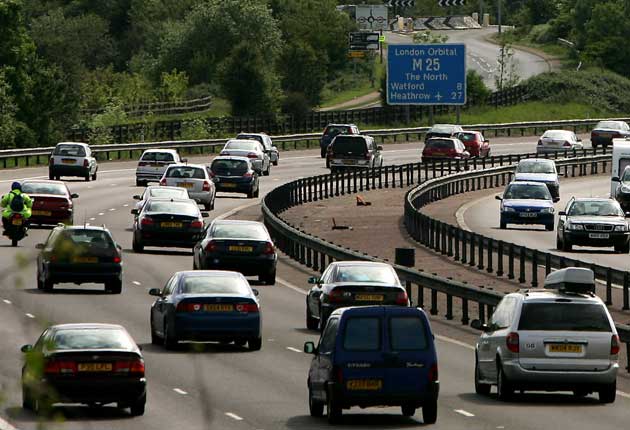Britain driven on to roads by falling cost of motoring
Attempts to cut emissions undermined by higher price of using public transport

Labour's efforts to slash carbon emissions are being undermined by the simple but remarkable fact that the cost of motoring has fallen while the cost of public transport has risen since the party came to power. Official figures, seen by The Independent, show that the cost of motoring has fallen by 13 per cent in real terms since 1997, while bus and coach fares have increased by 17 per cent above inflation. Rail fares have risen by 7 per cent extra above inflation.
The findings come despite the Government's pledge of cutting carbon emissions by 80 per cent by 2020.
Drivers often feel that they have been unfairly targeted by the Treasury, with the duty on petrol having increased dramatically since 1997. But the rises in the costs of running a car have been more than offset by the falling cost of buying and maintaining a car in real terms. For example, a Ford Fiesta with a 1.25-litre engine cost £9,165 when Labour came to power. Consumers can buy a similar model 12 years later for £9,995, making it much cheaper once inflation is factored in. The cost of maintenance has also fallen sharply as cars have become more reliable.
Meanwhile, the real cost of public transport continues to increase above the rate of inflation. Rail users were hit with fresh fare rises this year, despite the recession. Regulated fares, including season tickets and off-peak services, increased by an average of 6 per cent. Unregulated fares, which include advance purchase tickets, rose by an even higher average of 7 per cent. Those average increases hide dramatic fare increases for some commuters. For example, season tickets between Gillingham and London went up by £280, a rise of more than 10 per cent.
Coach travel costs are also increasing for some this year, with many services being removed from the Government's concessionary travel scheme for pensioners. Thousands of pensioners will be affected by the change, introduced after complaints from local authorities and bus operators that it was costing them too much.
The Association of Train Operating Companies blamed the Government's determination to reduce the industry's subsidy for the rail fare increases. The Department for Transport wants passengers to bear even more of the costs of running Britain's rail network. It is currently attempting to reduce the public subsidy handed to the industry and wants passengers to shoulder 75 per cent of the costs, which are currently split 50-50. Rail industry chiefs are putting pressure on the Government to axe the policy and actively favour public transport over less environmentally friendly forms of travel.
Iain Coucher, the chief executive of Network Rail, called for a rethink. "If we want to reduce our carbon emissions, we need to make the most environmentally friendly forms of transport the choice," he told The Independent. "If we are pricing people away from it, that is probably wrong in the long term.
"Over the last decade, we have dramatically improved the size and quality of the railway. Passenger numbers and punctuality are at record levels. So we have raised the game, but to some extent that has come on the back of higher fares to improve the service."
The rail industry watchdog, Passenger Focus, also called for the policy to be reversed. "People always cite price and reliability as the two main reasons for being unsatisfied with train travel," said Ashwin Kumar, its passenger director. "The Government needs to look at this policy again."
Despite the figures, the Department for Transport again refused to favour public transport over car use. A spokes-man said: "Investment in buses has more than doubled over the last 10 years and we are committing £15bn to our railways over the next five years. However, this does not necessarily mean giving up your car, which is why over the past decade we've delivered £150bn of investment on all forms of transport."
Norman Baker, the Liberal Democrats' transport spokesman whose parliamentary question revealed the statistics, said the Government still had not made public transport affordable enough to encourage people out of their cars. "These figures show starkly just what a raw deal train and bus passengers have had out of this government, and that car drivers, for all the moans about fuel prices, have done rather well," he said.
"While ministers are busy preaching about cutting carbon emissions, the Department for Transport has allowed polluting transport to become cheaper and cleaner transport to become more expensive. The Department is clearly part of the carbon problem rather than part of the carbon solution."
Theresa Villiers, the shadow Transport Secretary, said it left Labour's green credentials "in tatters".
Join our commenting forum
Join thought-provoking conversations, follow other Independent readers and see their replies
Comments